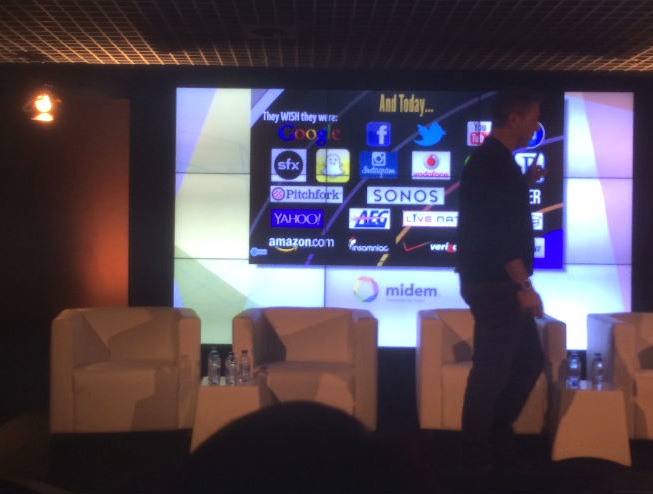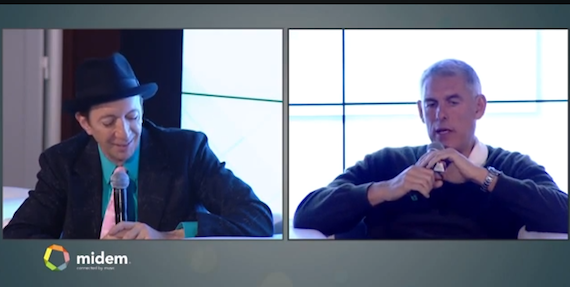

Mark Geiger discusses the future of the music business.
Sunday, Feb. 2, 2014:
It’s grey, windy and chilly in Cannes, but at MIDEM inside the Palais, there are heated discussions.
Mark Geiger, Global Head of Music, WME (USA), presented the fascinating and informative talk “20 Years of Pain. No More Fooling Around: The Definitive Future of the Music Business.” This was, by far, the most enlightening presentation at MIDEM.
Geiger stated that the record industry had a “chasm” when digital caused the industry to lose millions of dollars. “Part two of that chasm is coming. Change is already happening,” he said. “In the past, artists had it easy. Labels did the work of radio promotion, publicity and marketing, but now the artist is the marketer.”
Artists often bad-mouthed labels and some openly cheered when the power of labels was diminished, but artists must be careful what they wish for.
Geiger noted that “music files are a terrible experience” stating that “streaming is taking off. Files eat up computer memory, they cost a consumer and you can’t organize files.”
Geiger noted that the current “giants” like Facebook, Amazon, Google, Yahoo, iTunes and Pandora “reach 500 million to one billion people,” an unheard of reach a decade ago. “Access models are big. Future music models are subscription based, like Beats, Spotify and Pandora. Files are dropping, physical CDs and DVDs are dropping. Music Service Providers (MSPs) are here and the labels must participate.”
If labels participate, noted Geiger, “a customer paying $10-15 a month—and these fees will increase over time—will generate more money than album sales and MSP money will dwarf past monies and the new music industry will be bigger than the old music industry.” An advantage of streaming product means the label will “have no packaging or return costs, customers can curate a library and there will be big earning with a high margin with catalog revenue.”
“It used to cost about $15 for an album and not many fans bought an album every month,” he continued. “With the MSP model, over a billion consumers could be paying that much each month.” The key, according to Geiger, will be “integrating billing with cell phone bills. It could be part of ‘added benefits’ for cell phone customers.”
Geiger noted that sales of CDs have gone from $40 billion to three billion during a period when iTunes has gone from $5 billion to $25 billion in revenue, premium radio from $1-2 billion, artist channels from $1-2 billion and music access from $54 to $135 billion.
“It is not a good future for files,” said Geiger. “Labels must believe there is more money from streaming.” Geiger noted that the new service, Beats, is “the first time that industry insiders said ‘This is the future.’ In the past, tech companies have guided the future. Companies that don’t know about music are leading the music business. They think in terms of customer access. We think in terms of artists.”
Geiger advised labels to “license music and engage in digital streaming” because the future of music is “access, access, access.” He said that labels must “make sure the metadata is in order and stop slowing down the music industry” and, if this is done, “we could have a $100 billion plus music industry.”
• • •
The panel “Fueled by Video Success” was hosted by Andrea Leonelli with Digital Music Trends (U.K.) and featured Jordan Berliant, head of Music Management with The Collective Music Group (USA); Brandon Martinez, CEO of INDMUSIC (USA); Tom Pickett, Vice President of YouTube Content (Google, USA), and Geoff Taylor, Chief Executive of BPI and the BRIT Awards (U.K.).
Berliant stated that “there’s a huge change in what video is and what it represents. During the 1980s videos were to promote an act and their song but today a video is ‘The Thing.’” Martinez stated that “it is no longer an album cycle for acts, it’s a 12 month content cycle. Video must take fans behind the scenes because they want to know more than just a song.”
Tom Pickett from YouTube stated, “Seven or eight years ago, we made a big bet on the music industry. Video was almost dead then and we brought it back with a whole new model. Now, anyone can make and upload a video. We are all-in on music.”
Jordan Berliant stated that acts should ask of video, “Is it a promotion vehicle or a money maker? There are things we should be making money on that we’re not making money on. Videos can be a source of money but they’re not. I don’t blame Google or YouTube, it’s people making videos who don’t understand the consumer.”
Martinez noted that “Every new view of a video is going to lead to that viewer sharing that content.”
Pickett answered the charge that no one is making money from video stating, “In order to reach billions, the ad supported brand will reach that with the ad supported model so the brand can be built to monetize,” adding that “YouTube has paid over a billion dollars for video airplay.”
Berliant countered that “We’ve done too good a job teaching the consumer that it’s free.”
Pickett stated that “The paid subscription model has only worked in Scandanavia with Spotify because the charge is bundled with phone service.”
Addressing the idea of live streaming, Geoff Taylor stated that “We are going to stream the BRIT show. We found that most of the views are coming from outside the U.K. In the live stream we’re going to let fans watching voted on an award.”
The issue of streaming proved to be a contentious one, with YouTube’s Pickett noting that “60 percent of viewership comes from outside the market,” noting that a problem with live streaming is the different time zones around the world.
Berliant said, “We’ve done live streaming in the part with a Linkin Park show, but we face a problem because somewhere in the world it’s three in the morning while the concert is being held. The model that would work best is to have the live stream archived so fans can watch it when they want to.” The idea that fans don’t necessarily want to see something “live” but would rather watch it on their own time has proven to hold true.
During open questioning, an audience member confronted YouTube’s Pickett because Google has failed to take down pirate sites where consumers can download music for free. Geoff Taylor confirmed that the British Phonograph Industry (BPI), the trade organization for the U.K., sent 50 million notices to Google about pirate sites, including two million for a particular site and Google has failed to act. “When you know something is illegal, you should take it down,” Taylor said to Pickett. “If Google is going to have a productive relationship with the music industry, you need to do something about that.”
• • •

Tom Silverman (L) and Lyor Cohen.
Lyor Cohen, former head of Def Jam and Warner Bros. Records, was the keynote speaker to discuss his new venture, 300. Tom Silverman, head of Tommy Boy Records, hosted the event.
Cohen worked for a bank before he discovered rap music. He became a partner in Rush Management with Russell Simmons, then in 1984 joined Def Jam. In 1985 Rick Rubin, one of the founders of Def Jam, left for CBS and Cohen eventually filled the top seat there. From CBS, Cohen went to Warner Bros., where he headed the Interscope/Def Jam label. For the last 32 years, Cohen has lived each day “hoping I’ll meet the artist who will change my life and change popular culture. I’m really interested in watching an artist grow from nothing to successful.”
Cohen’s philosophy is: “Understanding magnificent is magnificent, but good is good. Good tricks you. You think you can make good great. But magnificent doesn’t happen that often and when you screw with good you get pulled out of position, and you miss the opportunity to find magnificent. Sign stars and don’t dust bums off.”
Cohen used the opportunity to announce a new partnership between 300 and Twitter.
• • •
The panel for “Who’s Investing In Music” was hosted by Allen Bargfrede, Executive Director of Rethink Music; with panelists Benji Rogers, CEO of Pledge Music (USA); and Mike Tunnicliffe, Chief Growth Officer of GroupM/WPP, the largest marketing company in the world.
Rogers noted that fans who donate to fund music projects fall into five levels: the casual fan donates about $68 per project, the next level is $182, followed by $344, the Digital Aficionado give about $402 per project, and those who want significant involvement give about $1,004. Rogers stressed that investing in bands with crowd sourcing entails the band involving fans in the “journey,” not just asking for money.
“You must give fans who source something to do,” said Rogers, “not just ‘attend my concert and buy my stuff.’ Most artists are creative but don’t think how their music will get to an audience and the impact it will have on them.” Rogers said that for bands involved in crowd sourcing, they should ask every day, “What have I given my fans to do today?”
Rogers also warned that “a business has a thousand moving parts and having thousands of investors could cause problems.” A single large investor—or several large investors—could cause problems if the investors want to dictate what the band should record or how they present themselves.
Tunnicliffe stated that marketing companies invest in music because “it is an opportunity that can produce content and promotion for the millennial market,” who “will spend $10 trillion during their lifetime.” This involves “moving away from the traditional. We’re looking for an authentic way of reaching the market, a way to organically get engaged.” In terms of Return on Investment (ROI), “we measure that by sales, shifts in image of the brand, and how it affects the millennial audience. Brands are not in the business of becoming an artist, they’re in business to promote their brand.” In terms of a business wanting to create a label or financing the development of a band, the business does not want to be involved “because it’s not what we do.”
“The labels have traditionally dis-enfranchised themselves from fans because they ‘fear’ them,” said Rogers. “The connection to fans used to come from retailers” but, with the decline of retail outlets, “the label now has to connect with fans.”

Category: Featured, Sales/Marketing
About the Author
Don Cusic is Professor of Music Business at Belmont University. He has authored 18 books, including his most recent “Discovering Country Music.”View Author Profile


